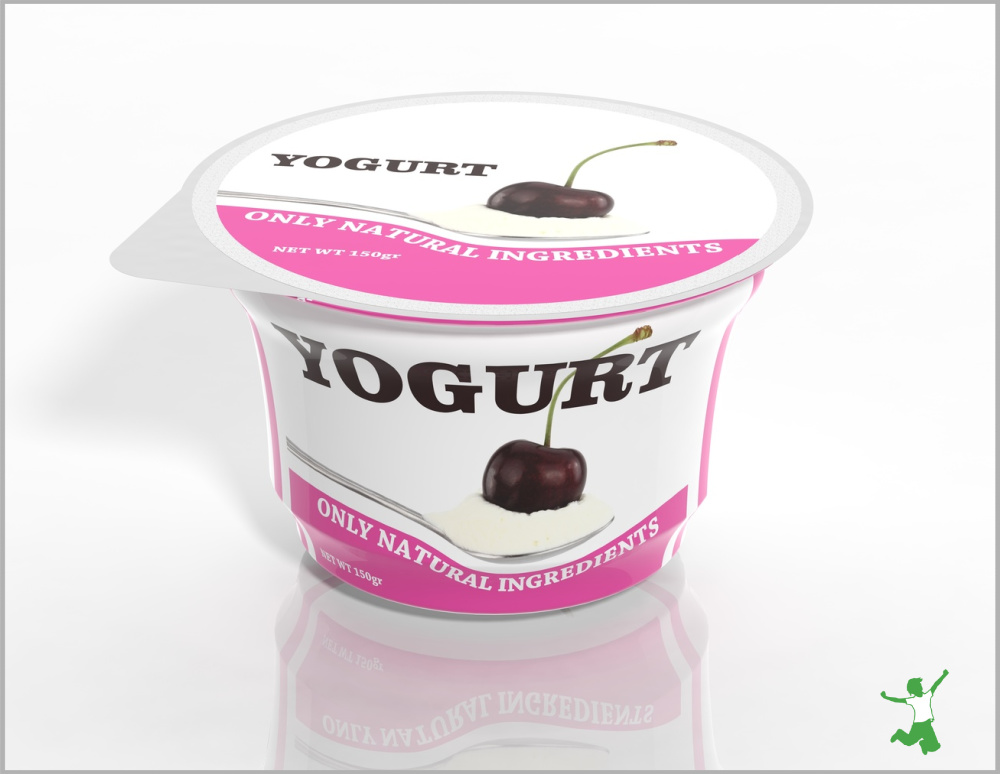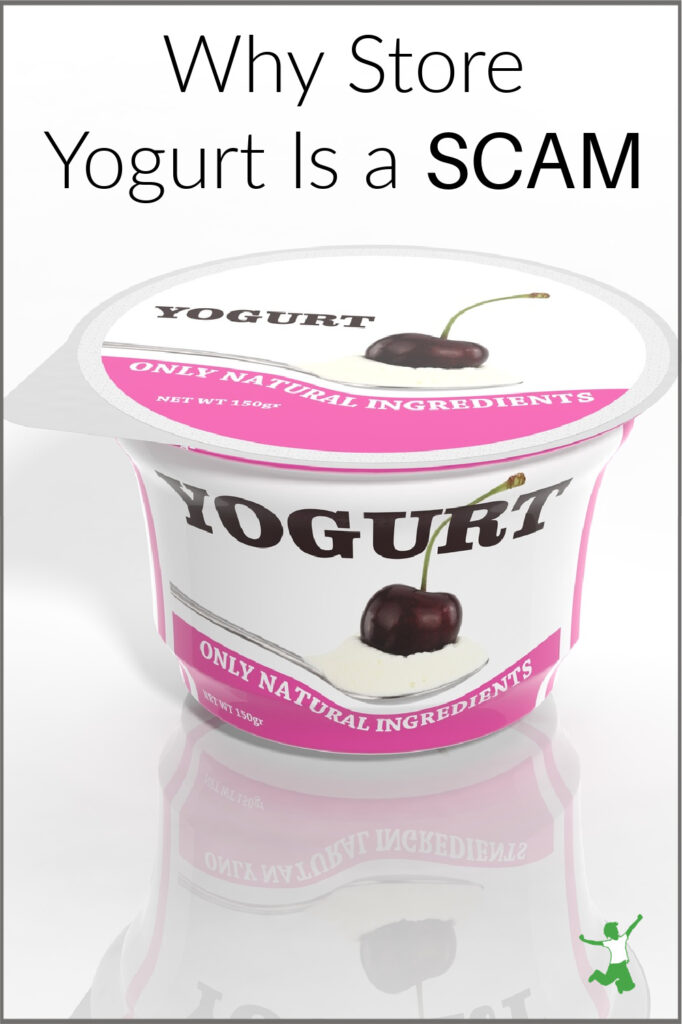The reasons why it is usually a waste of money to buy yogurt at the grocery store, the very few brands that are legit, and the best approach for enjoying yogurt that is truly probiotically active without breaking the bank.

As I was standing in line at the grocery store the other day, I noticed an older lady in front of me had an entire cart loaded with commercial yogurt.
I immediately felt very empathetic as she obviously was placing high importance on store yogurt in her diet. Perhaps she was attempting to help some sort of chronic digestive issue caused by the typical overmedicating of people her age.
What is really sad is that it is virtually certain that she was experiencing little to no benefit from her efforts and money spent.
This is because standard store yogurt, including those squeezable yogurt tubes for kids, is not the probiotically beneficial food that TV commercials and other compelling advertisements would lead you to believe.
The truth is that commercial yogurt is fermented for very short periods of time.
This includes highly popular Greek yogurt alternatives.
Improper Fermentation
The length of fermentation for commercial yogurt brands is so short (one person in the dairy industry told me that it is an hour or even less) that thickening agents are commonly added to give it the look and feel of real yogurt.
This is why Dr. Natasha Campbell-McBride MD, author of Gut and Psychology Syndrome, recommends avoiding commercial yogurt.
Instead, she recommends making yogurt at home and fermenting it for a full 24 hours to achieve maximum gut healing benefits.
The Specific Carbohydrate (SCD) Diet also recommends yogurt that is cultured for a full 24 hours.
Milk Sugars (Lactose) Still Present
Another problem that occurs by cutting corners at the factory is that commercial yogurt still contains plenty of lactose, as there was insufficient time for it to be completely consumed by the beneficial microbes.
Lactose is a disaccharide sugar, which is very difficult to digest for anyone with a digestive disorder.
Raw milk and raw yogurt contain lactase, the enzyme for digesting lactose, but pasteurized and homogenized store brands do not even if they are organically certified (heat destroys the enzyme lactase).
Thus, consuming commercial yogurt can often trigger autoimmune symptoms until steps are taken to heal and seal the gut wall so that it is no longer permeable.
In short, not only will store yogurt NOT help heal the gut, it can potentially make the situation WORSE.
GMO Sweeteners
Another problem with commercial yogurt is that sweetened versions often are of GMO origin.
Even health-savvy shoppers often don’t realize that if the label on commercial yogurt says “sugar”, it is virtually certain that sugar is also from a GMO source (beet sugar).
Only if the label says “cane sugar” or “organic sugar” does this guarantee that the sugar is GMO-free.
Other Considerations
Of course, making yogurt at home permits the selection of high-quality milk and avoidance of all the additives and sugar added to most commercial versions.
Yogurt fermented for 24 hours will most definitely assist your gut with the help of beneficial (though transitory) cultures that good quality yogurt is loaded with.
It is also helpful to note that yogurt made with raw milk will be naturally more drinkable-style like kefir than yogurt made with heated or pasteurized milk.
Cannot Make Yogurt Yourself?
The best policy when it comes to yogurt is to always make it yourself or buy it from a small farm that uses quality grass-fed milk (preferably raw) and ferments it properly.
You don’t need a yogurt maker! I make raw yogurt using a slow cooker. You can even make yogurt using your microwave (turned off, of course!) or oven as a low-temperature incubator.
If you must buy commercial yogurt when traveling, be sure to seek out one of the only two brands of 24-hour yogurt I’ve found that are commercially available (White Mountain and St. Benoit).
If you’ve come across any others, please add them in the comment section!
My online shopping hack will help you find these brands very quickly even if you are unfamiliar with the area you are visiting.









How about Bellwether farms yogurt that is sold by azure standard?
It is not fermented long enough to be therapeutic for your gut. If you are allergic to cow yogurt, Bellwether does make a sheep yougurt that I have suggested to people in the past, but, again, it is not fermented long enough to be beneficial though it is tasty, clean and yummy for those who don’t have digestive issues and can handle yogurt that still has lots of lactose in it.
Thank you so much for your – always – great information!
We really like the Trimona, (it is delicious!) but it is very hard to find.
Too often we choose Stonyfield Organic Probiotic Plain Yogurt, instead. It isn’t anywhere close to being as delicious as the Trimona, but it’s the ‘best’ we can find in the grocery store. I’m guessing this one isn’t any better than any of the others?? I was hoping it might’ve made the grade, but probably not.
Paying good money for ‘not’ yogurt, is frustrating at best.
Years ago we made our yogurt. I suppose we’re going to need to go back to that. We have an instant pot, but we’ve never used it for yogurt. It might be worth a try. We’ve always used the stovetop!
Thank you again for your inspiration and information! Have a lovely day!
If you can’t find Trimona (or one of the other few 24-hour yogurts on the market), then yes …. making your own is a must if you want yogurt that is actually doing something for your gut.
I think it’s same with the kefir. It doesn’t taste the same as homemade. Last time I checked the quality of the kefir with pendulum, it’s not helpful at all for the gut, no benefit, no live culture in it, and they are using thickening agent too. Myself I like kefir more, because lesser sugar in it and more ” p.b family culture”.
I think Maple Hill is one of the few good brands left. 100% grass fed and certified organic. No added sweeteners in their plain version, and the cream rises to the top.
Maple Hill is great, but it isn’t fermented for 24 hours, so is not probiotically active enough to be helpful to the gut.
Maple Hill is great company and their product is clean, but the yogurt is only fermented for 4-8 hours, and so is not probiotically active enough to be healing for the gut. For those with digestive disorders, the lactose that remains from the too-short fermentation time could be enough to produce symptoms.
What about Alexandre family farms?
https://alexandrefamilyfarm.com/collections/yogurt?srsltid=AfmBOoqcr9FpPy0v7ZBEDVY_EFReQd9U36fF6JhJIwT-sZpRNq-kes_B
Also, Trimona bulgarian yogurt
Alexandre farms yogurt is not fermented for 24 hours last I checked. It would not be probiotically active enough for maintaining gut health.
Trimona yogurt is fermented 30 hours which is great! Thank you for sharing this brand. I did not know about it (not available where I live that I’ve seen).
I’m wondering about the benefits of drinking raw milk clabber as opposed to raw milk yogurt. Does clabber have similar gut healing effects?
Clabbered raw milk has fewer strains in it than raw yogurt. Raw yogurt will have the probiotics naturally in the raw milk plus the additional strains from the starter.
I think I got candida when I took a good probiotic (maybe one pill for a few days) I got a bad die-off reaction of hives (ID reaction) and smelled like bread dough – it lasted for weeks, horrible feeling. I know homemade kefir is strong am I gonna get a big die-off? With regular yogurt I just get an excessive sweet smell after weeks of having a cup a day.
Thanks for the article! What about store bought kefir?
A much better choice! Homemade would be best though to ensure it is fermented for 24 hours. https://www.thehealthyhomeeconomist.com/video-thursday-how-to-make-kefir/
Can I make my yogurt in a crock pot and let it ferment for 24 hours?
I don’t have a crockpot, so am unable to provide input there. The Vita-Clay slow cooker is what I use and it makes great yogurt. https://www.thehealthyhomeeconomist.com/resources/#19